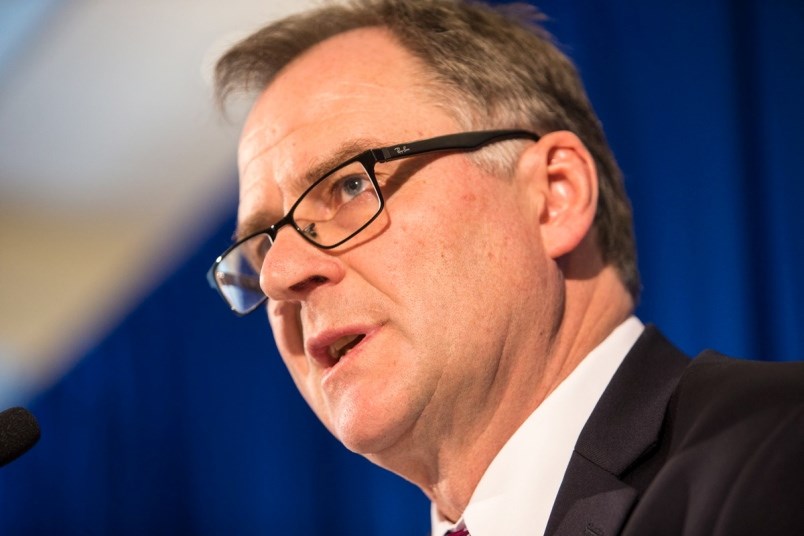British Columbia’s ombud is expressing deep concerns about the City of Vancouver’s plan to freeze the work of its integrity commissioner while a review is conducted of her mandate.
Jay Chalke says in the letter, sent this week and obtained by Glacier Media, that the suspension of Lisa Southern’s work during the review “undermines the independence of the role, council’s accountability and the credibility of efforts to promote ethical conduct by council members.”
He encourages Mayor Ken Sim and the council to “reconsider” its plan to suspend her work during the review. More broadly, he wants the province to take steps to create legislation to ensure integrity or ethics commissioners can carry out their work “independent of political interference.”
The Â鶹´«Ã½Ó³»integrity commissioner reviews public complaints or allegations of misconduct involving elected officials and advisory board members. This can include breaches of the city’s code of conduct, conflicts of interest, or other unethical behaviour.
Chalke’s letter is a weighty response by the province’s watchdog on public administration and follows a dramatic sequence of moves in recent weeks by Â鶹´«Ã½Ó³»council to contend with the office while it was reviewing complaints about the conduct of Sim and his officials.
Those complaints were ultimately dismissed, but not before revealing rifts between Sim’s office and the city’s Park Board – specifically, former members of the ruling municipal party who believed their operations were being interfered with. Southern said the complaints fell outside her mandate.
Her reports on those complaints followed a move days earlier by the majority ABC (A Better City Vancouver) council to push through a motion to conduct a review of Southern’s mandate and, importantly, to prevent her from investigating or pronouncing upon complaints while that review was taking place. It said it wanted to do so because Southern may rule upon a complaint that would fall outside of any change coming to her mandate.
Typically, though, a mandate review doesn’t freeze the work of a watchdog on integrity. It is business as usual until the mandate is altered.
"I am deeply concerned that council is considering suspending the commissioner's work for an unspecified amount of time, due to an unsubstantiated 'possibility' that some of her current work 'may be out of scope,'" Chalke says in the letter.
He asserts Southern has been cautious in the two years her office has operated and notes that when council considered its motion to freeze her work, “no examples were raised of previous work being out of scope.”
The ombud says the proposal to amend the bylaw governing the integrity commissioner could lead to a protracted period of suspended work – “several months, or longer.”
Council wasn’t able to amend the bylaw concerning the office’s work because another complaint was lodged with her office that appears to complicate council’s ability to vote upon the effort to review the mandate.
Council will next deal with the matter Sept. 25, when it will evaluate the review’s terms of reference and possible reviewers. Suspension of Southern’s work would extend 90 days after council receives the independent review’s report.
Critics of the proposal have said its effect is to silence complaints and ultimately weaken the office’s purview. Sim has maintained that isn’t the case, but that the new office still needs the refinement of its boundaries.
Southern herself noted the need for refinements to her mandate in her most recent annual report last December. As Chalke says in the letter, “the commissioner noted that the scope of her role was not always clear, and recommended amendments to the bylaw that, in her view, would address the matter.” Council didn’t take up her observations until the complaints about Sim and his officials were before her office.
In his Aug. 26 letter, Chalke urges Municipal Affairs Minister Anne Kang “to take further steps to develop a consistent, province-wide and legally binding approach to complaints and investigations into the conduct of council members.” He said locally distinct codes of conduct “remain vulnerable to political interference by the very body whose activities the commissioners are intended to superintend.”
In 2022, Chalke shared concerns about bylaw amendments by Surrey council to limit investigations by the city’s ethics commissioner ahead of the local government election. He reminded Kang in his letter, “there is a pressing need for the province [to] establish a legal framework governing the activities of local integrity/ethics commissioners.”
As Chalke notes in the letter: “The important work of these offices must be allowed to occur without the risk that their activities may be suspended or otherwise impeded by council. Instead, they must be able to carry out their work independent of political interference. That can only occur through provincial legislation.
Kirk LaPointe is a Glacier Media columnist with an extensive background in journalism.



